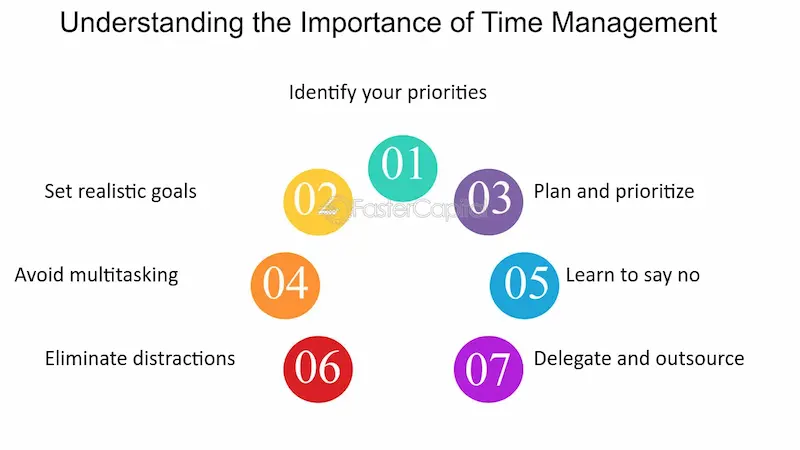Being a student isn’t just about attending classes or completing assignments. Between exams, projects, social activities, and personal time, it’s easy to feel overwhelmed. That’s why mastering time management is one of the most important skills you can develop. With proper planning, prioritization, and consistency, you can accomplish more in less time while reducing stress.
In this detailed guide, we’ll cover essential time management tips for students, complete with practical strategies you can start using today.
1. Understand the Importance of Time Management

Before diving into techniques, it’s crucial to understand why time management matters:
- Reduces stress: Knowing what to do and when helps prevent last-minute panic.
- Increases productivity: Focused, planned work saves time and improves quality.
- Improves academic performance: Regular, well-scheduled study sessions help retain information better.
- Allows a balanced lifestyle: You can enjoy hobbies, social life, and self-care without feeling guilty.
When you manage your time wisely, you’re not just organizing your day—you’re setting yourself up for long-term success.
2. Prioritize Your Tasks
Not all tasks are created equal. Learning to prioritize helps you spend your energy on what truly matters.
- Use the Eisenhower Matrix: Divide tasks into four categories:
- Urgent & important – deadlines and exams (do immediately)
- Important but not urgent – assignments or long-term projects (schedule these)
- Urgent but not important – interruptions like messages or notifications (delegate or limit)
- Neither urgent nor important – time-wasters (avoid)
- Urgent & important – deadlines and exams (do immediately)
- Rank tasks daily: Every morning, identify the top 3-5 tasks that must be done. Focus on these first to ensure progress on your most critical goals.
By prioritizing effectively, you reduce wasted effort and prevent stress from looming deadlines.
3. Create a Study Schedule
A solid study schedule is key to effective time management. Here’s how to make one that works:
- List all commitments: Include classes, assignments, exams, and personal obligations.
- Allocate time blocks: Dedicate specific periods for studying each subject. For example:
- 9:00 AM – 10:30 AM: Math
- 10:45 AM – 12:00 PM: English
- 12:00 PM – 1:00 PM: Lunch / Break
- 9:00 AM – 10:30 AM: Math
- Incorporate breaks: Use techniques like the Pomodoro Technique (25 minutes work, 5 minutes break) to stay focused without burnout.
- Be realistic: Don’t overfill your day. Allow flexibility for unexpected tasks.
Consistency is key—following a schedule trains your brain to focus during designated times.
You may also like to read this:
Best Study Tips For Students To Improve Learning & Focus
How To Focus While Studying: Proven Tips For Students
Daily Study Routine For Exams: Boost Productivity Fast
How To Improve Memory For Studying: Top Tips For Students
4. Set Clear and Achievable Goals
Goals give your study sessions purpose. Without them, it’s easy to procrastinate. Here’s how to set effective goals:
- Daily goals: “Complete 10 chemistry problems”
- Weekly goals: “Finish reading two chapters of history”
- Monthly goals: “Prepare for mid-term exams in all subjects”
Make your goals SMART: Specific, Measurable, Achievable, Relevant, and Time-bound. Clear goals help you track progress and maintain motivation.
5. Avoid Multitasking

While it’s tempting to juggle multiple tasks, multitasking usually decreases efficiency and focus. Instead:
- Focus on one task at a time
- Remove distractions: silence your phone, close unrelated tabs, and create a quiet study environment
- Take short breaks between tasks to recharge
Single-tasking improves concentration and helps retain more information in less time.
6. Use Time Management Tools and Apps
Technology can help you stay organized and accountable. Here are some popular tools:
- Planner apps: Google Calendar, Todoist, Notion
- Focus apps: Forest, Focus@Will, Pomofocus
- Reminder tools: Set alarms or notifications for deadlines and exams
Using these tools consistently makes it easier to follow your schedule and track your progress.
7. Learn to Say No
Overcommitting is a major obstacle to time management. Students often say yes to clubs, social events, or extra responsibilities, leaving less time for studies.
- Prioritize your commitments based on importance and deadlines
- Politely decline activities that interfere with your study plan
- Remember: it’s better to focus on fewer things and do them well than to do everything poorly
8. Review and Adjust Your Schedule
Time management is not a one-time task—it requires regular reflection. Every week, review:
- Did you complete your goals?
- Which tasks took longer than expected?
- Were there any distractions?
- How can you improve your schedule next week?
Adjusting your plan based on reflection ensures continual improvement in productivity and efficiency.
9. Take Care of Your Health
Your body and mind are your most valuable resources. Without proper care, time management becomes ineffective.
- Sleep: Aim for 7-8 hours to recharge your brain
- Nutrition: Eat balanced meals to maintain energy
- Exercise: Even 20-30 minutes a day improves focus and reduces stress
- Relaxation: Meditation, hobbies, or downtime help prevent burnout
A healthy lifestyle complements effective time management.
10. Practical Tips for Busy Students
Here are some additional strategies that make daily time management easier:
- Prepare the night before: Pack your bag, set out books, and review your schedule
- Batch similar tasks: Do all reading or assignments together to save transition time
- Use idle time wisely: Listen to audiobooks during commutes or revise notes while waiting
- Reward yourself: Small rewards for completing tasks increase motivation
FAQs: Time Management Tips For Students
Q1: How can I stop procrastinating?
A1: Break tasks into smaller, manageable chunks, set deadlines, and reward yourself after completing each chunk.
Q2: Is multitasking effective for students?
A2: No. Focusing on one task at a time improves efficiency and retention of information.
Q3: How do I balance studies and social life?
A3: Create a schedule that includes both study and leisure. Prioritize tasks and plan social activities around your study commitments.
Q4: What if I fall behind my schedule?
A4: Don’t panic. Reassess priorities, adjust deadlines, and continue. Flexibility is part of effective time management.
Conclusion
Learning how to manage your time effectively is one of the most valuable skills a student can develop. By prioritizing tasks, creating a structured schedule, setting clear goals, focusing on one thing at a time, and taking care of your health, you can study smarter, reduce stress, and still enjoy your life.
Start implementing these time management tips for students today, and you’ll notice a significant improvement in productivity, focus, and overall well-being.




